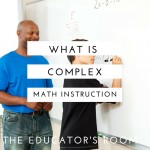When I told my students that we would have a word wall in our class, they looked puzzled.
“A word wall?”
“I never heard of having a word wall in math class before.”
“Huh?”
I pointed their attention to the words we had already gone over and said that the wall would grow throughout the year. But why have a math word wall? It’s not just to check off the literacy standard on your teacher evaluation. The value of the word wall and of studying vocabulary in general as a part of your mathematics instruction is crucial for three different, but connected reasons.
- Knowledge of mathematics vocabulary is essential in order to develop a student’s reasoning skills.
- Without knowing the vocabulary necessary to talk about math skills and concepts, they cannot progress toward a deeper understanding of mathematical knowledge.
- In order for students to make sense of verbal and written instructions during math instruction, they must know and understand mathematical vocabulary.
So how do you develop a word wall for mathematical purposes? It’s much as the same as any other word wall.
- Introduce the words in context of what you teach with relevant pictures, diagrams, and/or objects included.
- As a class, explain the meaning of the words and revisit these definitions frequently throughout the year.
- Make sure to use a variety of questions when reviewing the words so that every student has the opportunity to develop an understanding of their meaning.
Several examples of word walls and/or cards used on word walls exist out there on the internet. Here are a few of them:
- Math Vocabulary Word Wall Cards from the Virginia Department of Education
- Elementary Word Walls
- A High School Word Wall
- More Math Word Walls
Finally, make sure that you build upon your word wall. It should not grow stagnant as the year progresses. Just as a student in a language arts class must continually develop new vocabulary, a student in math class must continually learn and understand new math terms. However you want to create your word wall, just remember that the purpose of the word wall is for your students to remember what the words mean. The more illustrative, the better. The more input students give into making the word wall, the more likely it is that they will remember the words.
So, word up, math teachers! Get your word wall on!






Leave a comment